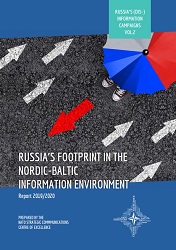Russia’s Footprint in the Nordic-Baltic Information Environment. Report 2019/2020
Russia’s Footprint in the Nordic-Baltic Information Environment. Report 2019/2020
Contributor(s): Elīna Lange-Ionatamišvili (Editor)
Subject(s): Politics / Political Sciences, Politics, Social Sciences, Political Theory, Communication studies, Sociology, International relations/trade, Politics and communication, Theory of Communication, Crowd Psychology: Mass phenomena and political interactions, Geopolitics
Published by: NATO Strategic Communications Centre of Excellence
Keywords: Nordic-Baltic countries; Russia; disinformation campaigns; Russia’s information influence; manipulation;
Summary/Abstract: This is the second volume issued in the framework of the project ‘Russia’s (Dis-)Information Campaigns in Nordic-Baltic Countries’. This project was initiated in 2016 as an ongoing effort to monitor and analyse Russia’s (dis-)information influence in the Nordic-Baltic region, which includes Denmark, Estonia, Finland, Iceland, Latvia, Lithuania, Norway and Sweden (the NB8). The first volume was published in January 2018.
- Print-ISBN-13: 978-9934-564-88-8
- Page Count: 81
- Publication Year: 2020
- Language: English
Narrative & Strategic Communications
Narrative & Strategic Communications
(Narrative & Strategic Communications)
- Author(s):Scott Ruston
- Language:English
- Subject(s):International relations/trade, Politics and communication, Theory of Communication, Geopolitics, Rhetoric
- Page Range:6-17
- No. of Pages:12
- Keywords:Strategic communications; information environment; communication campaigns; rhetoric; geopolitics;
- Summary/Abstract:Strategic communicators need concepts, methods and tools to both analyse the information environment in which they work and in order to craft communication campaigns that will resonate with audiences and accomplish organizational objectives. One of the most powerful rhetorical and analytic devices for these purposes is narrative. Narrative is so central to human understanding and decision making that communication theorist Walter Fisher proposed that humans should be called homo narrans or ‘storytelling man’ rather than homo sapiens (‘thinking man’). He argues, in part, that human decisions and behaviours are driven more by narrative logic and that rational logic while it still applies to human thinking is subordinate to narrative logic. Couple this assertion of fundamental human nature with a consideration of the presence of ‘narrative’ in reporting on any political contest or analysis of geopolitical conflict.
Hostile Narratives and Their Impact: The Case of Latvia
Hostile Narratives and Their Impact: The Case of Latvia
(Hostile Narratives and Their Impact: The Case of Latvia)
- Author(s):Māris Cepurītis, Austris Keišs
- Language:English
- Subject(s):Politics and communication, Theory of Communication, Crowd Psychology: Mass phenomena and political interactions
- Page Range:18-31
- No. of Pages:14
- Keywords:Latvia; hostile narratives; story vs. narrative; strategic communication; impact of hostile narratives; narrative as phenomenon; politics;
- Summary/Abstract:Narrative often is compared to a story. But authors of NATO Strategic Communications Centre of Excellence distinguish in their publication ‘Improving NATO Strategic Communications Terminology’ between a story and a narrative, defining story as ‘a temporally, spatially, and casually connected sequence of events’ and a narrative as ‘morals drawn from stories’. Consequently, stories are a way how narrative is communicated and shared between individuals. It is formed and maintained in human memory. In social and political context, narrative can be described as a framework that allows humans to connect apparently unconnected phenomena around some causal transformation.
Narratives on the Nordic-Baltic Countries Promoted by Russia
Narratives on the Nordic-Baltic Countries Promoted by Russia
(Narratives on the Nordic-Baltic Countries Promoted by Russia)
- Author(s):Diana Marnot, Ivo Juurvee
- Language:English
- Subject(s):Media studies, Government/Political systems, International relations/trade, Politics and communication, Theory of Communication, Geopolitics
- Page Range:32-51
- No. of Pages:20
- Keywords:Nordic-Baltic countries; narratives; Russia; officially promoted narratives; Kremlin-funded media; public communications;
- Summary/Abstract:A study done in 2016 on narratives officially promoted by the Russian Federation through Kremlin-funded media Sputnik, RT (formerly Russia Today), and Pervyi kanal, provided nuanced insight into the agenda regarding the Nordic-Baltic countries (NB8), which the Kremlin was trying to promote internationally. Although the research carried out in 2016–171 showed that Sputnik and RT are not popular among Nordic-Baltic audiences and that out of eight countries Pervyi kanal has higher ratings only in Latvia and Estonia, this selection of media still gives us an understanding about the Kremlin’s agenda and how this agenda has been framed in public communications.
An Introduction to Information Laundering in the Nordic-Baltic Region
An Introduction to Information Laundering in the Nordic-Baltic Region
(An Introduction to Information Laundering in the Nordic-Baltic Region)
- Author(s):Belén Carrasco Rodríguez
- Language:English
- Subject(s):Media studies, International relations/trade, Politics and communication, Theory of Communication, Crowd Psychology: Mass phenomena and political interactions, Geopolitics
- Page Range:52-80
- No. of Pages:29
- Keywords:Information laundering; Nordic-Baltic region; digital information environment; online communication patterns; hostile information influence; pro-Kremlin actors;
- Summary/Abstract:In an increasingly dynamic digital information environment, online communication patterns are constantly shifting, and hostile information influence activities are continuously adapting to spread influence faster and reach wider audiences. The use of Information Laundering techniques by Kremlin and pro-Kremlin actors is an outcome of this trend. Information Laundering (IL) has emerged as a security challenge in a context where global audiences are becoming highly reliant on online sources to obtain the information that will shape their opinions about current socio-political issues.

